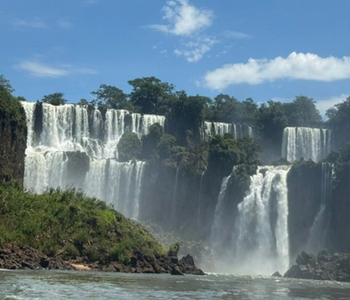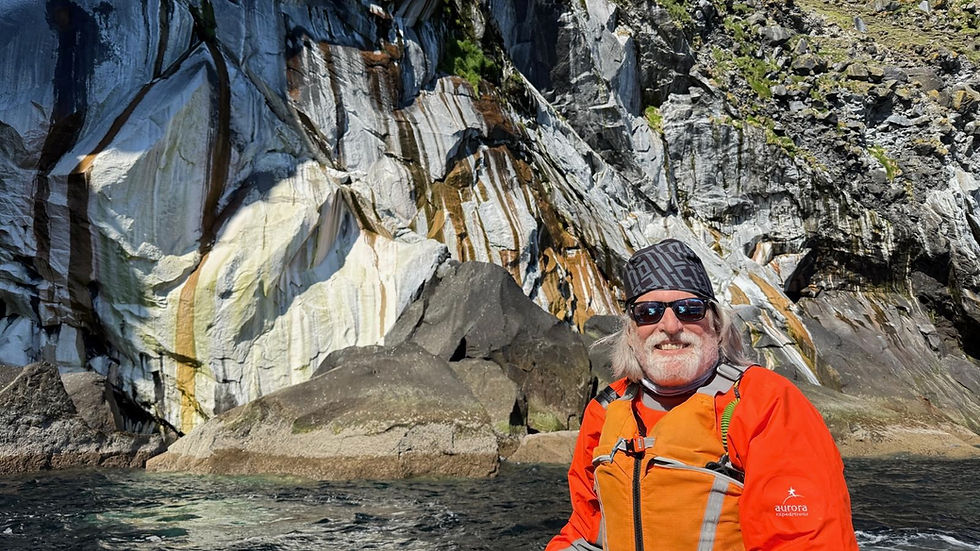Finding Beauty in the Breaking Point
- Thom Barrett

- Mar 16, 2025
- 4 min read

We often think of beauty as something grand—soaring mountains, endless oceans, or the raw power of a waterfall cascading over the edge of a cliff. And yet, some of the most profound beauty in life isn’t found in landscapes—it’s found in people.
A simple act of kindness, given at the right moment, can change everything. It’s easy to overlook these moments, to let them slip by unnoticed. But when you’re vulnerable—when you need help, and someone offers it freely, without expectation—it becomes something unforgettable.
Sometimes, kindness reveals itself when you least expect it. And sometimes, it’s the smallest act that makes the most significant impact.
Finding Beauty in the Breaking Point: A Lesson from Iguazú Falls
The air was thick with humidity, the kind that clings to your skin and seeps into your bones. This was supposed to be a manageable walk—a descent into the heart of Iguazú Falls’ Lower Circuit, where the cascading waters would be close enough to touch. The metal walkways shimmered under the midday sun, their rails too hot to hold for long. The falls thundered in the distance, their relentless power sending mist skyward, creating shifting rainbows in the humid air.
But Iguazú Falls is not just a waterfall—it is a world unto itself.
Stretching nearly 1.7 miles (2.7 km) across the border of Argentina and Brazil, Iguazú’s 275 individual falls dwarf even Niagara. While Niagara plunges 167 feet (51 meters) at its highest point, Iguazú’s tallest drop, the Devil’s Throat, crashes down 269 feet (82 meters)—nearly twice the height. The sheer volume of water—ten times Niagara’s peak flow—creates a roar so powerful it vibrates in your chest before you even see it. The falls are not something you simply observe; they surround and consume you.
That day, I had planned to explore alone, without my guide, Gaston. I wanted to move at my own pace, to experience the falls without distraction. But I had overlooked something critical.
I hate the heat. My body does not handle it well and never has. Put me in -25°F, and I’ll be fine—comfortable, even. The sharp bite of Arctic air, the dry sting of extreme cold, that I can handle. But 90°F, drenched in humidity? Absolutely not. Heat drags at me, slows my body, drains my energy in a way that cold never could. And yet, somehow, I had convinced myself that I could manage.
I misjudged. On a grand scale.
I hadn’t brought water, convinced the distance was too short to need it. I hadn’t anticipated temperatures climbing well over 90°F or how quickly the beauty of a place can turn against you when your body begins to fail.
At first, it was just sweat—heavier than usual, soaking my shirt faster than I expected. Then came the shortness of breath, the sluggish weight pressing against my chest. The breaks became more frequent. I pressed forward, convincing myself it was just the heat, nothing more. I just needed to reach the top of the stairs.
The same gentle slope that had welcomed me into the falls now became a battleground. The staircase stretched ahead, seeming to grow steeper with every step. My heart pounded harder, the air around me growing tighter. Sweat turned cold against my skin, and I felt the shift—that moment when discomfort tips into something more dangerous.
People passed by, some glancing at me, their expressions shifting from polite curiosity to concern. I must have looked bad. A few offered water. I refused. Pride? Stubbornness? Some warped sense of accountability? I had made my bed by not bringing any water, and now I had to sleep in it. This was my problem, caused by my own shortsightedness and my own overconfidence.
Until I couldn’t.
Dizziness hit me like a wave, forcing me to sit on the stairs, head between my knees. The roaring falls faded behind the pulsing in my ears, my body betraying me in ways I hadn’t felt before. I was overheating, burning from the inside out, yet my skin was turning cold. The chills set in—deep, consuming, unnatural. My head felt like it would crack open, my body teetering between collapse and something worse. I wasn’t in control anymore.
And then—a bottle of water appeared beside me.
No words, no name, no expectation of thanks. Just a simple act of kindness, given freely and anonymously. I looked up, scanning the crowd, but whoever had left, it was already gone.
I sat there, humbled, the cold plastic pressing against my palm. A moment ago, I had been fighting my own limits, refusing to accept that I needed help. Now, I had no choice but to take what was offered—to let someone else’s kindness be the thing that got me through.
I drank deeply, the water cooling my throat and my mind. I soaked my handkerchief, pressing it to my neck, and the world around me began to settle. I was still dizzy, but my body was coming back from the edge. The cool compress made a huge difference.
It wasn’t a grand rescue. There were no dramatic gestures, no sweeping moments of salvation. It was one small, quiet act—but in that moment, it was everything.
Sitting there, recovering, I realized something: resilience isn’t always about pushing forward. Sometimes, it’s about knowing when to stop, when to accept help, when to recognize that strength isn’t just about endurance—it’s about grace.
And in that, there was an unexpected beauty.
When I finally stood, I wasn’t the same as before. My body still ached, my head still swam, but something in me had shifted. I had felt the full weight of something profound—a nameless kindness given without expectation.
And that beauty, that quiet generosity, was something I would carry forward.
By the time I made it back to the bus, the falls still roared behind me, mist rising into the sky, rainbows shifting with the wind. But I no longer saw just the falls.
I saw the hidden beauty in the people around me—the ones who offer help without hesitation, without recognition, simply because they can.
And I knew, then and there, that I would pass it on.
Thom












Comments